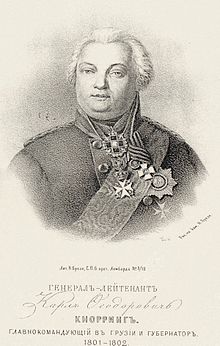Carl Heinrich von Knorring
Carl Heinrich von Knorring ( Russian Карл Фёдорович Кнорринг , Karl Fjodorowitsch Knorring ; born May 22, 1746 in Marien-Magdalenen ; † February 12, 1820 in Moscow ) was a Russian lieutenant general .
Life
Origin and family
Carl Henry was a member of the baronial line Kaltenborn-Uddewa-Lugden the Estonian noble family Knorring . His parents were the judge and heir on Arroküll , Kaltenborn, Uddewa and Erwita, Friedrich von Knorring († 1761) and Dorothea Elisabeth von Zoege († 1792).
The also Russian generals General Gotthard Johann von Knorring (1744-1825) and General Otto Wilhelm von Knorring (1759-1812) were his brothers, Johann Franz von Kochius (1729-1797) was his brother-in-law.
He married Barbara Vladimirovna Davydova († 1836), who had already been widowed twice. There were no children from this marriage.
Career
Knorring joined the Land Cadet Corps in St. Petersburg in 1758 . He took part in both Turkish Wars 1768–1774 and 1787–1792 . In 1789 he was awarded the Order of St. George IV class as a colonel and battalion commander in the Bug Jäger Corps . He was then successively in command of the Ingermanland Infantry Regiment and the Tautical Grenadier Regiment before he was promoted to brigadier and regiment chief of the Revaler Musketeer Regiment in 1794 , major general in 1796 and finally in 1799 lieutenant general and chief of the Kazan Musketeer Regiment.
In 1800 he was honored with the Grand Cross of the Order of St. John of Jerusalem . Knorring was commanding general of the 10th Caucasian division or inspection from 1799 to 1802. In this context he was war governor and from 1800 also head of civil administration in Astrakhan . In 1801 he intervened independently in Georgia . He preferred the annexation of the country and was appointed governor general and chief conductor in 1802, and as such marched into Tbilisi . At the beginning of 1803, however, he was dismissed as incompetent and dishonest, and was recalled to Moscow and dismissed from active service.
Before that, he was awarded the Alexander Nevsky Order and the Order of St. Anna 1st Class . He spent the last years of his life in Moscow, where he was President of the Church Council and from 1818 to 1820 he was also the patron of the Evangelical Lutheran Petri-Pauli Church.
Web links
- Baltic Historical Commission (ed.): Entry on Carl Heinrich von Knorring. In: BBLD - Baltic Biographical Lexicon digital
- Карл Федорович Кнорринг Entry in the military encyclopedia Военная энциклопедия Сытина , Volume 12, 1913, p. 601 ( Russian )
Individual evidence
- ↑ a b c Genealogical manual of the Baltic knighthoods. Part 2, 3: Estonia. Görlitz 1930, p. 82 ; Genealogical manual of the baronial houses A 3, Volume 21 of the complete series, CA Starke Verlag , Limburg (Lahn) 1959, p. 238.
| personal data | |
|---|---|
| SURNAME | Knorring, Carl Heinrich von |
| ALTERNATIVE NAMES | Knorring, Karl Fjodorowitsch; Кнорринг, Карл Фёдорович (Russian) |
| BRIEF DESCRIPTION | Russian lieutenant general |
| DATE OF BIRTH | May 22, 1746 |
| PLACE OF BIRTH | Mary Magdalene |
| DATE OF DEATH | February 12, 1820 |
| Place of death | Moscow |

